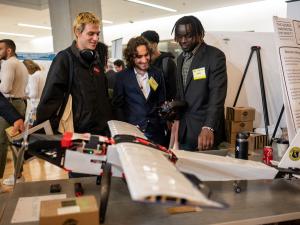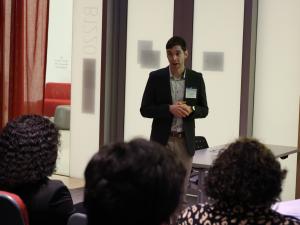Home
An interdisciplinary, problem-solving department
"We are at the forefront of addressing complex societal challenges through systems thinking. Addressing major issues such as climate change, public health, trustworthiness in artificial intelligence, critical infrastructure systems, innovation, privacy, and connectivity requires a systems approach. Working alongside policymakers and technology leaders, we are dedicated to creating and implementing complex adaptive solutions that improve decision-making and shape the world around us."
Ekundayo Shittu
Department Chair
Explore our cutting-edge interdisciplinary educational and research programs
Prospective Students
Developing skills for impact: We are one of the oldest and largest programs of our kind in the United States, offering undergraduate and graduate programs that combine engineering, management, business analytics and technology. We give you the skills necessary to deploy technology for impact.
Faculty and Research
The world is our lab: Faculty and students in the department work with partners throughout GW, across DC, and around the globe to conduct research that covers a wide array of sectors and topics. Meet our faculty and learn about our focus research areas.
Dr. Szajnfarber to lead $3m NSF grant for research on AI to transform the future of work
Dr. Zoe Szajnfarber is the principal investigator on this interdisciplinary grant from the National Science Foundation. She will work with colleagues in the EMSE and Computer Science departments to develop a new model for graduate education.
Ukraine seeks solutions to drought with EEMI experts
The day after Ukraine’s president met with President Biden, the country’s agriculture minister came to GW to meet with Environmental and Energy Management Institute experts to explore working together to mitigate the impact of climate change on the country’s agricultural sector.
EMSE Online Ph.D. Alumnus Andre Douglas Named NASA Astronaut Candidate
Dr. Douglas is one of 10 new astronaut candidates from a field of more than 12,000. The valuable research skills he honed as a doctoral student have been helpful as he's advanced his career.
GW to Co-Lead a New $20 million NSF AI Institute
The George Washington University is co-leading a multi-institutional effort supported by the National Science Foundation (NSF) that will develop new artificial intelligence (AI) technologies designed to promote trust and mitigate risks, while simultaneously empowering and educating the public. The NSF Institute for Trustworthy AI in Law & Society (TRAILS) unites specialists in AI and machine learning with systems engineers, social scientists, legal scholars, educators, and public policy experts. The multidisciplinary team will work with impacted communities, private industry, and the federal government to determine how to evaluate trust in AI, how to develop technical solutions and processes for AI that can be trusted, and which policy models best create and sustain trust. David Broniatowski, an associate professor of engineering management and systems engineering at GW, is the lead principal investigator of TRAILS at GW.
The new institute is expected to transform the practice of AI by encouraging new innovations that foreground ethics, human rights, and input and feedback from communities whose voices have previously been marginalized. The NSF, in collaboration with government agencies and private sector leaders, has now invested close to half a billion dollars in the AI institutes ecosystem—an investment that expands a collaborative AI research network into almost every U.S. state.
Upcoming Events
News

Engineering Ingenuity on Display at the 2024 R&D Showcase
April 26, 2024
On April 26, 117 GW Engineering students gathered in the Science & Engineering Hall to display their research at this year’s Research & Design and Senior Design Showcase.

Shaping Tomorrow’s Engineers: GW Engineering Hosts ASEE MAS Conference
April 22, 2024
The American Society for Engineering Education Middle Atlantic Section’s Spring 2024 Conference was brought to the Science & Engineering Hall by EMSE professors and conference co-chairs, Eric Dano and Joost Santos.

Professor Helveston Reveals Electric Vehicle Depreciation Trends in New Study
April 18, 2024
Assistant Professor of Engineering Management and Systems Engineering John Helveston released new data about depreciation in electric vehicles (EVs).








